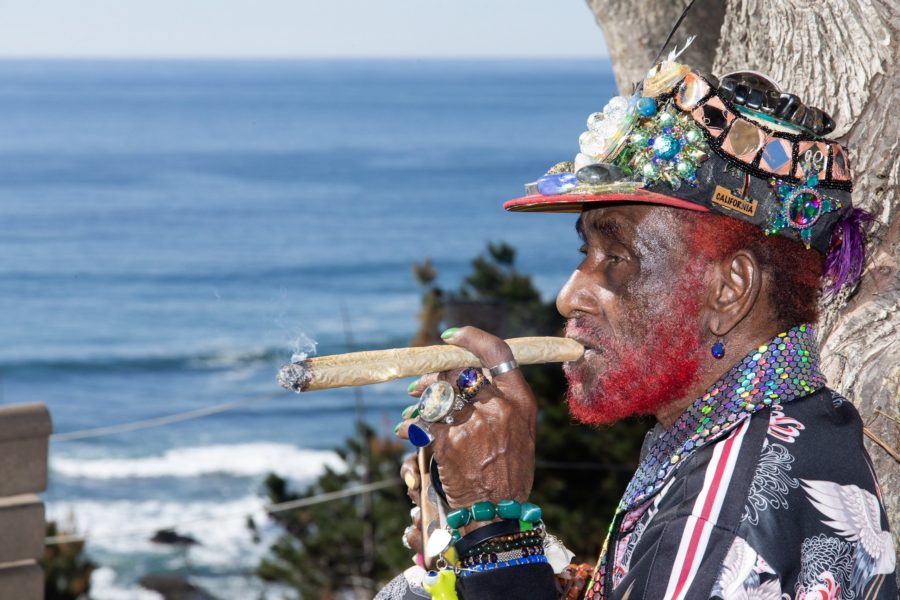
A tribute to Lee ‘Scratch’ Perry
Famous Jamaican producer and artist Lee “Scratch” Perry passed away on Sunday, August 29th, at the age of 85. Over the years, several High Times writers have caught up with the mysterious musician and provided a glimpse into his life.
Perry took on many nicknames in the course of his career: the “Upsetter”, the “Super-Ape”, “Inspector Gadget”, “Pipecock Jackson” and the “Firmament Computer”. But he was mostly called “Scratch” from one of his early songs, “Chicken Scratch”. He loved and experimented with almost every new genre of music and is considered a pioneer in the dub field.
Perry did the best work Jamaica has ever produced. He produced the Wailers’ Soul Rebels and Soul Revolution albums – the first time non-Jamaicans heard Bob Marley sing – and also produced some of Jamaica’s most famous artists.
Bob’s son, Ziggy Marley, provided a testimony that was widely spread across various platforms. “It’s always been a unique experience to be around him,” Marley told Rolling Stone. “He opened our heads with his creativity and personality. Some people thought it was madness, but I realized it was genius, uniqueness, courage and freedom. He didn’t apologize for being himself, and you had to accept that and find out the deeper meaning of his words and his character. “
Lee “Scratch” Perry’s Legacy
Perry built his name through various jobs at Coxsone Dodd’s famous Studio One in Kingston, Jamaica. The sounds of Jamaica constantly evolved from ska to rocksteady to reggae. Perry founded the studio band The Upsetters in 1968. In 1973, Perry built his own Black Ark recording studio in his back yard. There Perry produced for the best artists in Jamaica, including Junior Byles, Junior Murvin, the Heptones, the Congos and Bob Marley.
“Scratch was a tremendous person, he was a creator, a pioneer, a wizard, a shaman, a magician, a philosopher, a musicologist,” Marley continued. “A man like him will never come back here,” said Marley. “Unique. He will be missed very much by those of us who have had the time not only to experience him through music, but to know him personally. “
Perry first heard punk rock in the late 1970s and played an album by The Clash to Bob Marley. Perry loved her covers of Junior Murvin’s “Police and Thieves” and The Maytal’s “Pressure Drop” so much that he produced the The Clash song “Complete Control”. This led Bob Marley to write “Punky Reggae Party” – his homage to the punk rock bands they met.
In 1998, Perry appeared on the Beastie Boys album Hello Nasty.
Also in 1998, the High Times’ Doug Wendt interviewed Perry and confronted him about whether his band, the Upsetters, would ever get back together. Chris Simunek of the High Times interviewed him 10 years later.
In 2003 Perry won a Grammy Award for the best reggae album with the album Jamaican ET and the following year Rolling Stone placed Perry at number 100 on its list of the 100 greatest artists of all time.
Perry on cannabis
Perry was always there when friends like Bob Marley or Paul McCartney needed a train.
In 1980 Paul McCartney was arrested in Tokyo, Japan for a whopping 7.7 ounces of cannabis – with serious consequences in a country that does not tolerate drug use. Perry had worked with McCartney and his wife in 1977 when he produced Linda’s covers of “Sugartime” and “Mister Sandman” at Perry’s Black Ark studio in Jamaica.
Upon hearing that McCartney was arrested, Perry took action and wrote a letter to the Tokyo Attorney General demanding his release. “I, LEE PIPECOCK JACKSON PERRY, would like to express my concern that a quarter pound in the case of Master PAUL McCARTNEY is an excessive amount of herbs,” Perry wrote. “… I find the herbal powers of marijuana in its widely recognized abilities to relax, calm down, and create positive emotions to be a must.”
High Times followed Perry for decades, and even managed to interview him at the exact moment he quit smoking weed in his 70s Year 2008. Marijuana, ganja, lamb bread – I don’t smoke anymore. ”Perry even went back later, hinting that too much weed in a Fader interview is a bad thing.
Few people revered ganja as much as Perry’s over 50 years of near-continuous use, and this is evident in his work and legacy.

Post a comment: